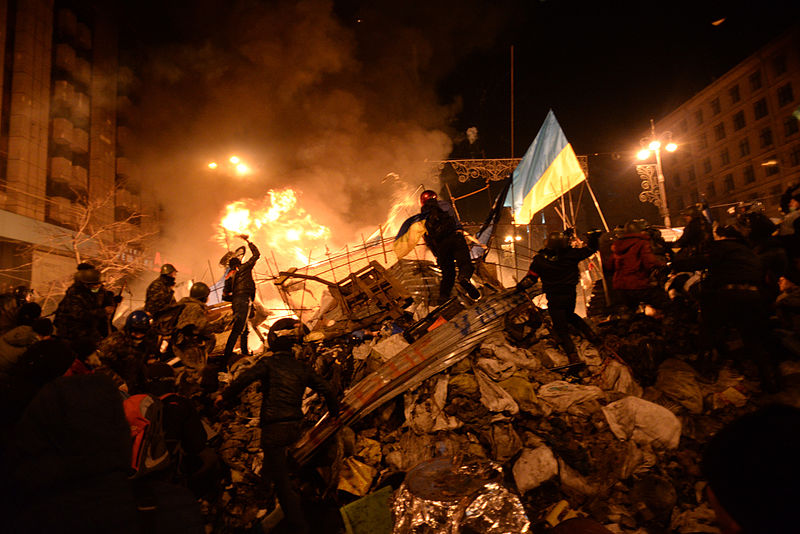
Awije Bahrami, a Classics and German major, is in her second year as the Entertainment Editor for The Montclarion.
“Great Ukraine!” was the slogan many Ukrainians shouted during their revolution, which, for the people of Ukraine, is known as the Revolution of the Bourgeois or the Revolution of the Creative Class.
The uprising was a message from the people of Ukraine to the rest of the world; they demand to break free from Russia’s post-imperial sphere of influence. It took place from the end of 2013 until mid-2014 and resulted in Russia’s annexation of the Ukrainian island of Crimea, as well as the ongoing war between the Ukrainian army and Russian separatists in the Luhansk and Donbas region of eastern Ukraine.
The immediate cause for the recent revolution was the abrupt refusal of former Ukrainian president Viktor Yanukovych to sign the Ukraine-European Union Association Agreement which would have allowed for closer economic and political ties between Ukraine and the European Union and could have resulted in Ukraine moving away from Russia’s influence. The declining Ukrainian economy and the high level of corruption in the government were also underlying causes of the uprising.
Andrii Bondarenko, a graduate History major in his last year at the Ukrainian Catholic University in Lviv, Ukraine, who participated in the recent revolution, observed that the demonstrators and activists were mostly people between the ages of 20 to 40.
“They [grew] up in [independent] Ukraine, they know other languages and they’ve been [to] foreign countries,” said Bondarenko. Young activists, like Yulia Marushevska, whose “I am a Ukrainain” YouTube video went viral during the revolution, poet/novelist Serhiy Zhadan and others who represent the Ukrainian people, call for de facto independence.

A photograph of demonstrations in Ukraine in Feb. 2014.
Photo courtesy of Mstyslav Chernov (wikipedia.org).
Ukraine has a history of uprisings. In 2004, the Orange Revolution gained momentum after the presidential elections were claimed to have been rigged and voter intimidation had been used. However, unlike the revolution in 2014, the one in 2004 remained bloodless.
Ukraine was part of the Soviet Union (USSR) from the beginning of its existence until 1991. Although many years have passed since the dissolution of the USSR, Russia still wants to keep Ukraine as close as possible both economically and politically.
According to Timothy Snyder in the New York Book Review, Russian president Vladimir Putin argues that “members of the European Union have abandoned traditional European culture [as in religious, sexual and political exclusivism] for ‘decadence’” and that Russia’s way is the only representation of civilization.
In 1991, when the USSR dissolved and Ukraine declared its independence, the validity of this separation was only on paper. Ukraine is still very much connected to Russia in many aspects of its society.
Ukrainians now call for the actual implementation of independence. They want to decide for themselves what road they want their country to take, which is the road to European integration.
Bondarenko said that the biggest reminder of the revolution is the war Ukraine is currently fighting against Russia. “[Russia doesn’t] want [an] independent and strong Ukraine; they want to become a new empire and, without Ukraine, it couldn’t happen.” Ukrainians, on the other hand, want to separate themselves from Russia because Ukraine has its own language and culture.
Ukrainians want leaders who care and fight for the interest of Ukraine and not for the interest of Russia.
In Kiev, the capital of Ukraine, and on the Maidan, the central square of the city, peaceful protests were interrupted by violence from the government on Nov. 21, 2013 as a way to disperse the crowd.
Since the beginning of the revolution and the ongoing conflict in the east of the country, 6,000 people have died for the future of Ukraine. After a year and a half, people are mostly focused on the economy and social problems.
“We need to improve our government, so we are trying,”
said Bondarenko. However, Bondarenko went on to explain that they are in a state of war.
The people who gave their lives on the Maidan did not die in vain. In some respects, it was good that Yanukovych did not approve the Ukraine-European Union Association Agreement. It was the necessary step for Ukraine to get out of Russia’s orbit and bring de facto independence into the forefront of public discussion.


